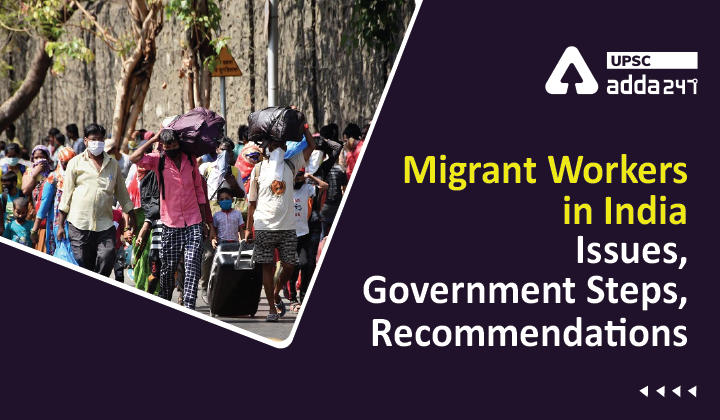Table of Contents
Migrant workers in India UPSC
Who is a migrant worker?
- A “migrant worker” is a person who either migrates within their home country or outside it to pursue work.
- Usually, migrant workers do not have the intention to stay permanently in the country or region in which they work.
- As per census 2011, the total number of internal migrants in India is 36 crore or 37% of the country’s population.
- The Economic Survey pegged the size of the migrant workforce at roughly 20 per cent or over 10 crore in 2016.
Issues of migrant workers
- No social security benefits: Migrant workers face issues as they hardly have social security. Facilities like breaks, overtime, sick pay and minimum wage laws may not be followed because there is no recourse for the worker.
- Coercion at work: Due to poor regulation at workplace, issues like sexual or physical assault incidents often goes underreported. The fear of consequences also forces the migrant worker to remain shut.
- Inhospitable condition: Workers may be housed in unsanitary conditions, which are especially dangerous for children. Migrant workers are also subject to harsh conditions on the job, such as working in extreme weather for long hours with no breaks.
- Discrimination: Since the migrant worker are not from the place of their work, cultural differences present problems for migrant workers even when they are away from the job site. Local residents discriminate or resent migrant workers for taking the available jobs in the area, thus fuelling the ‘sons of the soil’ feeling.
- Vulnerable community: Despite contributing 10 per cent of India’s GDP, these workers are socially and politically vulnerable.
Government steps for migrant workers
- Pradhan Mantri Garib Kalyan Yojana: After the lockdown, Pradhan Mantri Garib Kalyan Yojana with a financial package of Rs. 1.7 lakh crore was launched to help poor, needy and unorganised sector workers of the country.
- PM SVANidhi Scheme: PM SVANidhi Scheme was launched to facilitate collateral free working capital loan upto Rs.10,000/- of one-year tenure, to approximately, 50 lakh street vendors, to resume their businesses.
- Pradhan Mantri Garib Kalyan Rojgar Abhiyan: In order to facilitate employment of migrant workers who have gone back to their home state, Pradhan Mantri Garib Kalyan Rojgar Abhiyan was initiated in 116 districts in Mission Mode.
- State migrant cell: Migrant workers’ Cell is being created to prepare a database of migrant workers in states with mapping.
- eShram portal: It is a national database created to register the unorganised workers in the country, including the migrant workers.
- National policy on migrant workers: NITI Aayog has been mandated to prepare a draft national policy on migrant workers to reimagine labour-capital relations while integrating the migrant workers within the formal workforce.
Needed steps for migrant workers
- Make agriculture a profitable business: One of the fundamental reasons of migration is low returns in agriculture sector. Once agriculture becomes remunerative, migration would reduce.
- Concept of minimum floor level income: There should be a minimum floor level income below which any worker cannot be paid. The government has rightly set up SP Mukherjee committee to make this concept a reality.
- Schemes like Pradhan Mantri Gram Sadak Yojana and MNREGA works significantly in increasing the rural income, and thus decreasing the rural emigration. More such schemes should follow the course.
- Article 43A: This Article of the Directive Principles of the State Principles talks about provision of workers’ participation in the management of the industry. It should be formulated to improve the standard of living of the workers.
- Social security: It is necessary to manage the social security of migrant workers by making proper use of schemes like Shram Yogi Maan Dhan by the government.
Read UPSC favourite topics





 TSPSC Group 1 Question Paper 2024, Downl...
TSPSC Group 1 Question Paper 2024, Downl...
 TSPSC Group 1 Answer key 2024 Out, Downl...
TSPSC Group 1 Answer key 2024 Out, Downl...
 UPSC Prelims 2024 Question Paper, Downlo...
UPSC Prelims 2024 Question Paper, Downlo...




